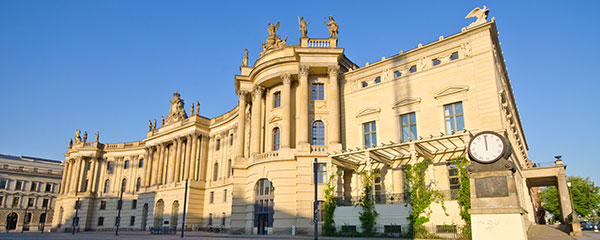The German Research Landscape
Germany enjoys a global reputation as a world leader in research and academic training, characterised by excellent facilities, multi-disciplinary interests and a well-funded infrastructure. There are more than 800 publicly-funded research institutions in Germany, as well as research and development centres operated by private and industrial corporations.
In 2013, Germany’s gross domestic expenditure on research and development was in excess of 80 billion euros, ranking the country fourth in the world for research spending, above the UK, France and Canada. Internationally, Germany is also in the top tier of a small number of countries to invest more than 2.5 percent of their gross domestic product in research and development. This commitment to enterprise has led Germany to being at the forefront of research activities worldwide.
Germany is particularly attractive for international doctoral students and postdocs, not least because of the use of English as a primary research language, but also the comprehensive career opportunities arising from Germany’s enhanced international partnership in research. The country’s commitment to the internationalisation of degree programmes through the Bologna Process as well as the establishment of key enterprises such as the research-oriented Excellence Initiative has signified the country’s emergence as the largest and most diverse research nation in the EU.
Germany’s research activities are focused within higher education institutions, internationally renowned non-university organisations and a strong private and industrial research sector:
- Universities: There are 400 higher education institutions in Germany which currently have 26,000 international doctoral students and employ 38,000 international academics. There are over 230 universities of applied science (Fachhochshulen) which have an emphasis on research.
- Non-university research institutes: Germany has numerous research organisations which are considered to be world-leading in a variety of disciplines. Prominent organisations include the Fraunhofer Society, the largest research society in Europe, the Helmholtz Association and the Max Planck Society. Germany also has over 200 research institutes operated and funded at Federal and Länder (State) level, covering areas of interest to each municipality.
- Companies and Industrial research: German companies work closely with research institutes and universities to fund a variety of programmes, particularly in new technology, science and industrial and environmental engineering. You can find more information about Germany’s private sector organisational structure.
The research infrastructure in Germany is well-supported by various public, private and international agencies. Research funding is overseen by the Federal Ministry of Education and Research. The largest awarding organisations are the German Research Foundation (DFG) and the German Academic Exchange Service (DAAD). There is also a vast range of grants and scholarships available to both PhD students and postdoctoral researchers.
There are ample career opportunities for doctoral students, postdocs and senior researchers to advance their careers in highly-structured research environments in Germany. Whether you take a traditional career route in a university or choose to work for a research institute or private company, you will be well supported by Germany’s exceptional funding network. Many German companies work closely with universities and research institutions in application-oriented research and development so there are numerous ways for postdocs to pursue their careers. To find out more see our ‘After your PhD’ page.
A high-ranking education system coupled with Germany’s rich culture, heritage and international prominence makes the country one of the most favoured destinations in the world for expats. Academic staff and postdoctoral researchers will find that Germany offers a high standard of living and good schools for non-German families are in abundance. Europeans benefit from the free movement of people between EU states and the fact that most German employers, both in universities and research institutes, are fluent in English also makes for a smooth transition for expat employees.
Max Saved Jobs Reached
A maximum of 500 Saved Jobs can be created against your account. Please remove an existing Saved Job in order to add a new Saved Job.
Manage Saved Jobs








